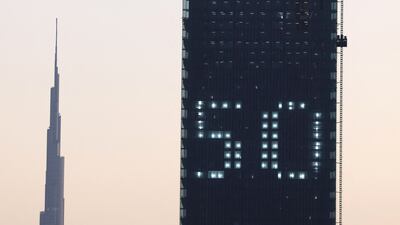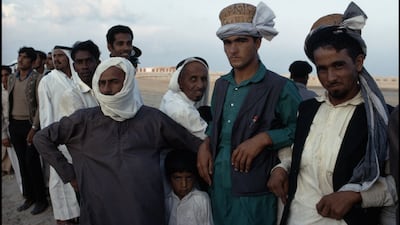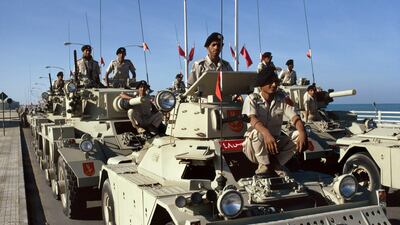Fifty years ago, the emirates that lined the northeastern coast of the Arabian Peninsula were abuzz, as their rulers prepared to join them into a United Arab Emirates.
Just a few days before December 2, 1971, the day the UAE was established, Abu Dhabi was also celebrating the fifth anniversary of the Founding Father Sheikh Zayed’s accession to become ruler of the emirate.
Bruno Barbey, a Moroccan-born French photographer, was there to capture the event. Today, The National has published a number of his rare images. They include ones of Sheikh Zayed hosting formal events, spectators at a celebratory camel race, a parade of Abu Dhabi's defence forces and an Emirati boy waving Abu Dhabi's flag on a ramshackle bike.
The photos demonstrate quite how much life has changed in 50 years. The streets are quiet, and vast open spaces, today covered by skyscrapers, extend into the distance.
But plenty more in the pictures hasn't changed. The tenets of Emirati culture, hospitality, patriotism and pride in heritage dominated then, as they still do.
Looking at these photos, many will be feeling pride and thanks for how far the country has come since those memorable but tougher times. It has been a remarkable transition. In 1971, the country's population was under 280,000. Today, it is more than 10 million, 86 per cent of whom live in its vast, cosmopolitan and very new urban centres. It has also been hard-won. On Tuesday, the country marked Commemoration Day, to honour those who have died for the country. Remembering them, Sheikh Mohamed bin Zayed, Crown Prince of Abu Dhabi and Deputy Supreme Commander of the Armed Forces, said on Monday that the UAE "draws lessons from the sacrifices of the nation's martyrs for a strong and resilient country, capable of facing challenges... We are proud of them."
While today is one of reflection on how far things have come, people are also looking forward to the next 50 years. Throughout 2021, or Year of the 50th, as the government has marked it, a series of long-term projects has been unveiled to make the next five decades as productive as the last.
They include a strategy to draw more local talent into the private sector, and apprentice schemes and initiatives to support start-ups. All are geared towards creating a dynamic economy that is fit for the future. Indeed just yesterday, the board of Abu Dhabi National Oil Company approved a $127 billion spending plan. Along with state-backed energy company Taqa and Mubadala Investment Company, it is also set to become a shareholder in Masdar, a global leader in renewable energy.
These projects are underpinned by 10 guiding ideas, Principles of the 50, which include strengthening the union, a foreign policy that serves the UAE's highest interests, investing in human capital, promoting openness and tolerance and making the country a home for tech and future-focused industries.
This is all part of the UAE's ambition to maintain its status as a dynamic, diverse and technologically advanced country, which also tries to offer solutions in an increasingly challenged region and world.
If its plans are realised, in 50 years' time people looking at photos from National Day 2021 will be able to see a physical transformation similar to the one from 1971. They should, however, also see the same cultural continuity.
Constant change is inevitable. But by listening to the stories of those who were there at the beginning, it is clear that much about the country should have the endurance to stand the test of time.













